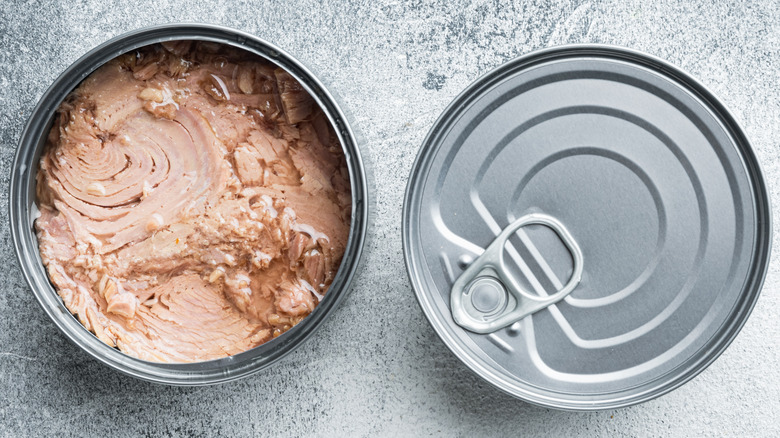The Maximum Amount Of Tuna You Can Safely Eat Each Week
Tuna has long been a favorite among consumers. In fact, according to the National Fisheries Institute, Americans eat a whopping one billion pounds of the canned (or pouched) fish annually. As many know, however, there can be a downside to eating too much of this lunchtime favorite: mercury exposure.
Eating more than the advised amount of tuna each week can result in increased exposure to the neurotoxin. Mercury poisoning can cause several concerning neurological symptoms, including coordination loss, memory problems, seizures, and tremors. According to the EPA, other signs of mercury poisoning include the loss of peripheral vision, impaired speech, hearing, or movement, muscle weakness, and a numb, "pins and needles" feeling in the hands, feet, or mouth.
Luckily, it's relatively easy to make sure your seafood consumption doesn't leave you with heightened mercury levels. Simply keep an eye on your tuna intake and supplement your diet with other types of fish when necessary.
How much tuna is safe to eat each week?
The amount of tuna one can safely eat on a weekly basis depends on a few factors, including the individual's weight and the type of tuna consumed. Canned albacore tuna (also called white tuna) contains three times the amount of mercury found in canned light tuna, per the FDA. Because light tuna (which comes primarily from skipjack) is known for its lower mercury levels, it is safe to eat in higher quantities. According to the administration, adults can typically consume two to three 4-ounce servings of light tuna each week. However, if you choose albacore tuna, you should limit your consumption to only one 4-ounce serving per week
MedicalNewsToday offers even more precise recommendations for tuna consumption based on body weight. For those weighing over 140 pounds, for example, it's safe to consume a single serving of canned light tuna every three days — but only one serving of canned albacore tuna every 10 days. In general, the less one weighs, the more infrequent their tuna consumption should be.
Children and pregnant people should consume with caution
The two groups advised to limit their consumption of tuna — as they can be especially sensitive to the effects of mercury — are children and anyone who may be pregnant.
The FDA recommends that children under the age of 11 only consume two servings of tuna per week and only the canned light tuna variety (including skipjack), as it is the lowest in mercury. The serving size varies according to the age of the child and is basically about the size of their palm. Children between one and three years old should have only two ounces per week. Those aged 4-7 can safely have four ounces, children 8-10 can have six ounces, and those 11 and up can have up to eight ounces.
Pregnant people (or those that may become pregnant) and anyone breastfeeding can safely consume two to three servings of canned light tuna per week. A serving is four ounces for these individuals, so it's best to keep in mind a typical can of tuna is five ounces. If these individuals wish to consume other varieties of tuna, they can include albacore and yellowfin but should max out at one serving per week of those.
It's important to note these FDA-recommended amounts include the consumption of all fish for the week, not just tuna. Fish with higher mercury levels that should be completely avoided by both groups of individuals include bigeye tuna, king mackerel, marlin, orange roughy, shark, swordfish, and tilefish.


